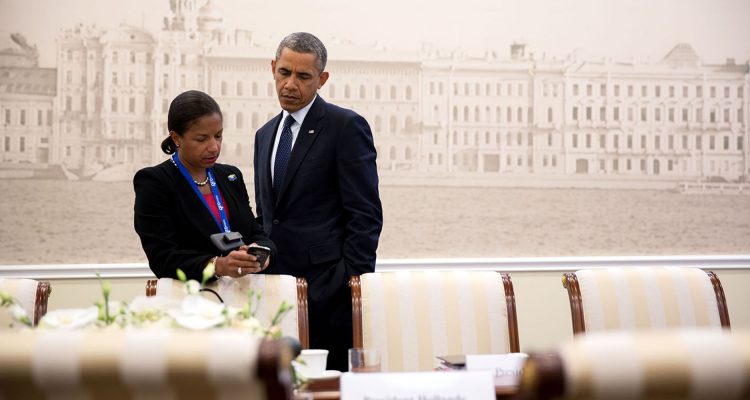Despite being the first Black President, Barack Obama has generally been elusive on race. From his condescending campaign lectures on Black fatherhood to his farcical beer summit, Obama has tried to toe a fine line between endorsing an explicitly Black political agenda and embracing the white racial frame. This tendency shows in his speech, his policies and even his advisors. Former United Nations Ambassador Susan Rice is no exception. Her Open Visions Forum speech, while well-delivered and tightly-focused, left much to be desired in the truth department. Although Ambassador Rice spent the majority of her speech repudiating Donald Trump’s foreign policy agenda, she rarely touched on race.
Racism is a cornerstone of Trump’s political agenda. It’s the organizing principle of his America First movement. It’s evident in his proposals for a border wall, his failed attempts to enact a muslim ban and his automatic opposition to any policy supported by the first Black President. His past remarks on undocumented Mexican immigrants, Syrian refugees and foreign terrorists, have all made it clear that white nationalism lies at the heart of his agenda. Trump’s international isolationism goes hand in hand with support for social service retrenchment. Both rest on the premise that resources should only be expended on the deserving. The deserving being defined as those that directly benefit from a white Christian male supremacist agenda. Trump isn’t the first American political leader to draw from this tired, bigoted script. From the New Deal to the New Democrats, discourses on race and entitlements have had a special and continuous hold on the white American public. As the power of the state grew in popularity and importance, our political leaders discovered that these discourses were the only ways out of partisan gridlock and certain electoral defeat. The interplay between racism and the stability of our political system cannot be ignored if one wishes to make a serious critique of the Trump administration.
Ambassador Rice’s remark that Trump “is squandering our greatest asset, America’s leadership of the world!” was her most meaningful statement of the night. Through his erratic foreign policy pronouncements and isolationist agenda, Trump has been giving up the proverbial game. Dismantling discursive and representational practices that position America as the leader of the free world makes it much harder for America to impose its will on the international stage. Trite discourses about equality and democracy mask the exploitative, interventionist agenda that undergirds America’s hegemonic position. Without these rhetorical devices, it becomes a lot more difficult to put your faith in a democracy that has never been truly democratic, and it becomes impossible to believe in a free market that isn’t the least bit free.
Ambassador Rice’s examples of “strong, steadfast” leadership such as using USAID to assist farmers increase crop yields in Ethiopia, create small business loans in Haiti and supply electricity in Kenya show us the true face of American imperialism. We tell struggling nations to adopt our democratic values, institutions and markets and they will experience prosperity and freedom; yet we ignore the fact that America has had a 200-year head start aided by land seizure, slave labor and political disenfranchisement. The market will always be slanted in favor of white Western nations because it was built to exploit and exclude people of color. It’s mind boggling how former Ambassador Rice, a descendant of slaves, could say that there’s never been an inherent conflict between America’s interests and values. How leaders like the former ambassador can brand the United States as a champion of democratic values and institutions while arguing that America should continue to position itself as the global hegemon is also beyond me. After all, few phenomenons are less democratic than a self-appointed world leader.
These discursive practices aim to obscure the exploitative roots of our material reality. They give credence to the notion that dialogue is overrated. The University presented the Ambassador’s appearance as an open dialogue when it was anything but. The ambassador’s sly reference to the ghetto party also gives credence to this notion that dialogue is an overrated buzzword meant to stop radical changes in their tracks. After the ghetto party incident the University took few, if any concrete steps to address its diversity issues. Discussion was privileged over monetary investment in on-campus diversity groups and recruitment initiatives. An aid or scholarship fund to attract people of color would have been a great first step; following it up with publically released demographic targets, and genuine efforts and mechanisms to reach said targets would have been even better. Yet instead we got more “dialogue” from the same University officials and students who put us in this situation to begin with. The truth of the matter is the ghetto party probably wouldn’t have happened at a more diverse school. The tone, content and nature of dialogue varies from audience to audience. I doubt that Ambassador Rice would have led off her speech with a generic anecdote about how kids need to get off their iPhones and participate in the political process at a more racially and economically diverse university. The former ambassador certainly wouldn’t have neglected to honestly talk about race either.


Leave a Reply